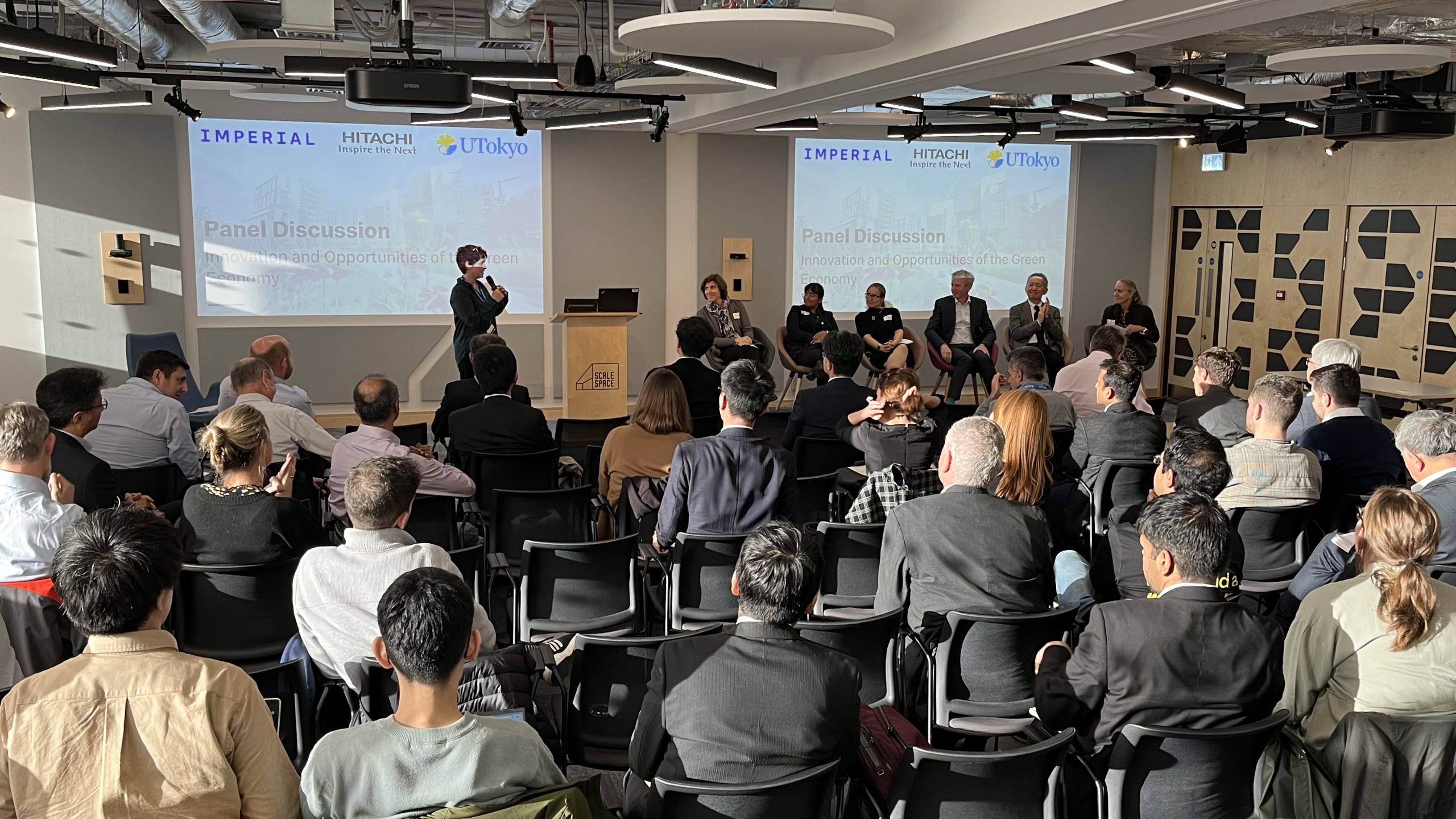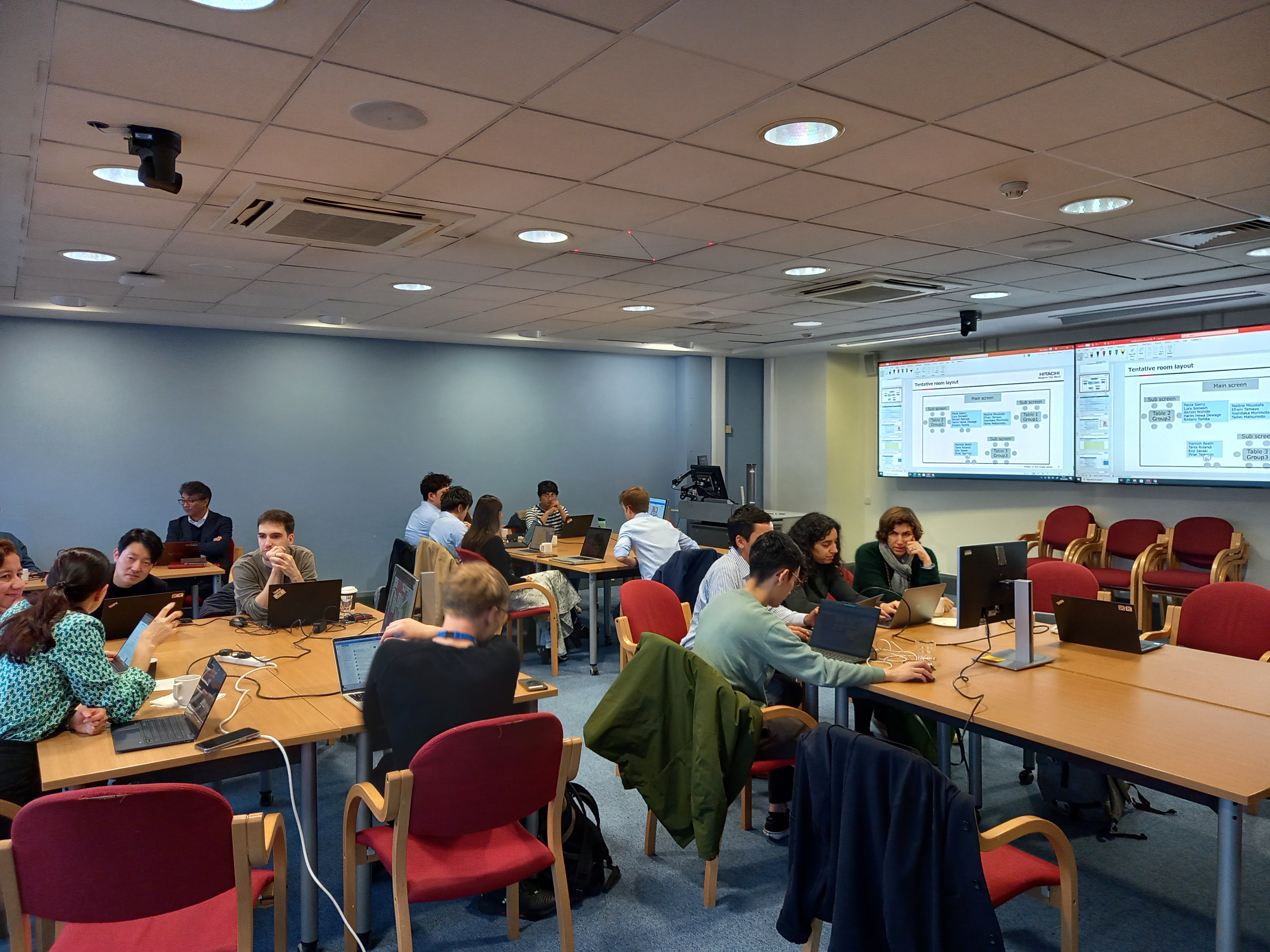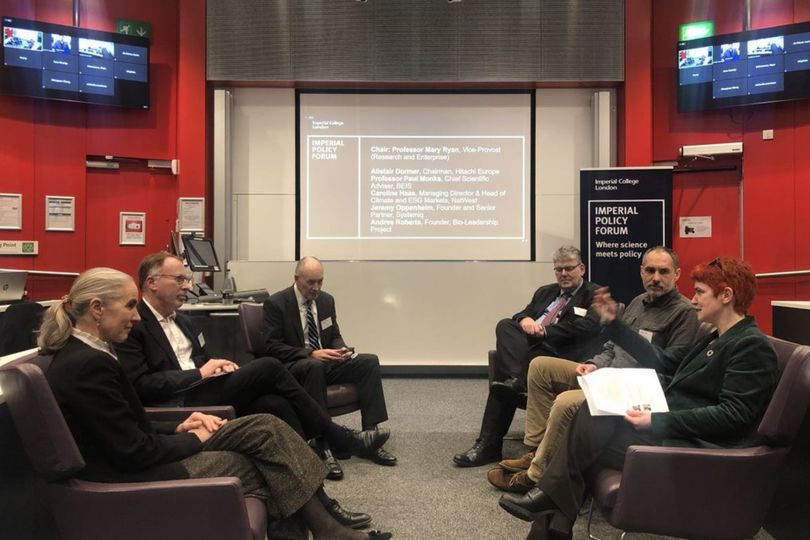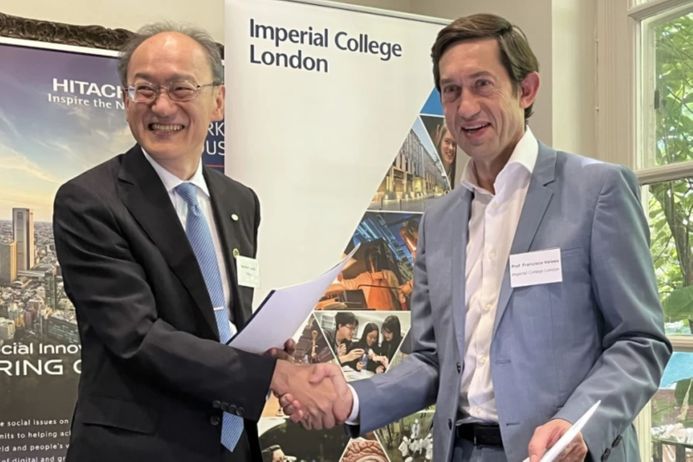Imperial, The University of Tokyo, and Hitachi focus on opportunities of a carbon neutral future

In October 2024, a series of collaborative events, including interdisciplinary research workshops and a panel discussion on innovation and opportunities in the green economy, brought together participants from Imperial College London, The University of Tokyo, and Hitachi. These activities further strengthened the partnership between the three institutions, fostering deeper collaboration on key challenges in the transition to carbon neutrality and beyond.
Over three days, participants convened at Imperial’s campuses to explore critical research topics for their joint Japan-UK initiatives. Discussions spanned a wide range of areas, including decarbonisation, carbon circularity, carbon accounting, critical minerals, financing and routes-to-market of green research and the social acceptance of climate technologies. By pooling their expertise, attendees identified new research opportunities for addressing these pressing challenges through collaboration.
Panel discussion
On October 17th, the panel discussion, hosted by the Hitachi-Imperial Centre for Decarbonisation and Natural Climate Solutions at Imperial’s White City Campus, was moderated by Professor Mary Ryan. It brought together experts from industry, finance, and policy to debate on innovation and opportunities of the green economy under Chatham House rules. Setting the scene, an Imperial Professor outlined the challenges of achieving net-zero emissions and warned of the dangers of exceeding carbon budgets, emphasising the critical need for feasible decarbonisation pathways.
This was followed by a Professor from the University of Tokyo who introduced the concept of “integrated transitions,” showcasing how a holistic approach that includes biodiversity and local development can address urban sustainability challenges. Together, the panelists, explored carbon footprint in supply chains, integrated transition between carbon neutrality and other fields, the use of AI, integrating heat utilisation in solutions, policy guidance for technological gaps, social acceptance, and cooperation. Wide-reaching discussions also included the role of AI, the financial return on climate adaptation measures; the stability of carbon markets; transition finance in the UK and Japan; advice for budding entrepreneurs; demand-side of the energy sector; validation of greenhouse gas emissions and environmental impact. Emphasis was placed on collaboration across sectors and borders to tackle the complex challenges of the energy transition. Social engagement and governance systems were also highlighted as critical to ensuring long-term success.
The panel discussion was followed by a showcase of clean-tech start-ups demonstrating innovative solutions in energy storage and carbon capture.
Interdisciplinary research workshop
|
Young researchers from all three organisations participated in an interdisciplinary workshop, discussing “Contribution beyond achieving carbon-neutrality” for two days. They pooled expertise on topics as diverse as carbon circularity, carbon accounting, battery operation and social acceptance of climate technologies to brainstorm fresh opportunities that may be tackled by this Japan-UK initiative.
|
 |
The diverse ideas of research topics that the participants proposed were clustered into wider themes and mapped over four areas namely, government, finance, industry, and academia, to visualise their relations. The clustered themes that were identified are the following:
- Measurement and standardisation: From decarbonisation focused measurements to universal and comparable metrics for all planetary boundaries
- Resource management: Identify critical resources and measures to alleviate severe circumstances using circularity approaches and accountability
- Socio-economic aspect of sustainability transitions: Recommendations for stakeholders to deliver socio-economic prosperity in sustainability transitions
- Data driven asset operation: Assess the contribution from modelling and optimisation of asset operation including the impact of energy consumption of using AI
- Social and environmental economics including biodiversity finance: Integration of environmental and biodiversity considerations into financial instruments tracking allocation, attribution, accountability of externalities, and benefits
- Comparative best practices, particularly among cities: Promote learning opportunities based on identifying useful thinking and best practices based on experiences and attempts to achieve sustainability transitions in cities
Summary and next steps
Throughout the events, the key messages highlighted the importance of integrating socio-economic perspectives, such as social issues and nature-positive outcomes, while focusing on policy acceptance and technology adoption. Collaboration among stakeholders, mobilising private capital for adaptation, leveraging AI in regional energy transitions, and fostering just and integrated transitions were emphasised as critical for achieving sustainable progress.
The challenges mentioned in the panel discussion and the research topics identified in the workshop will serve as a base to guide the next steps of the collaboration in activities such as joint publications. The events highlighted both the immense challenges and vast opportunities of the green economy. By fostering dialogue between scientists, policymakers, and industry leaders, events like this pave the way for actionable strategies toward a sustainable future. As the urgency of climate change grows, the insights shared during the event underscored a powerful truth: collaboration across sectors is not just desirable—it is essential.
Biodiversity and Ecosystem Function - Briefing Note launch and panel discussion
On 22 February 2024 we held the launch of our Briefing Note Biodiversity and Ecosystem Function: A global analysis of trends. This event was co-organised by the Imperial Policy Forum. High levels of biodiversity are vital in preserving ecosystem function. However there remains major gaps in understanding how ecosystems work, and how this interacts with climate change. Co-author Dr Will Pearse (Reader in Evolutionary Ecology in the Dept of Life Sciences) presented his work on this, including key recommendations for policy makers, followed by a panel discussion with:
- Prof Mike Morecroft (Head of Climate Science, Natural England)
- Akiko Furuya (Global Ecosystem Protection Specialist, Hitachi Energy)
- Prof James Bullock (Senior Researcher, UK Centre for Ecology & Hydrology)
- Kathryn Brown OBE (Director of Climate Change and Evidence, The Wildlife Trusts)
Hitachi-Imperial Centre launch event
Identifying the Climate Gamechangers for a Post Net-Zero World: Imperial College academics were joined by our partners at Hitachi and colleagues from industry and the Department for Business, Energy and Industrial Strategy (BEIS) at an event on 25 January 2023 to launch the new Hitachi-Imperial Centre for Decarbonisation and Natural Climate Solutions.
News and events blocks
News
More news28 March 2025
Women in sustainability showcased at Imperial26 March 2025
Podcasts - Redefining Energy - Mark O'Malley

-Hitachi-The-University-of-Tokyo-and-Imperial-workshop_Tokyo-Nov-23-(002).jpg)

